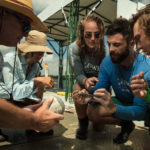UWF researcher deep sea dives
Matthew Schwartz, University of West Florida assistant professor of Environmental Studies, has an affinity for the ocean. As he should, since he recently traveled over a mile and a half below its surface. Schwartz participated in a three-week cruise aboard the research vehicle (RS), "Atlantis" which was the mother ship to the "Alvin," a deep-sea vehicle, to collect information on how internal waves in the ocean might affect nutrient cycling in oxygen deficit zones.
Matthew Schwartz, University of West Florida assistant professor of Environmental Studies, has an affinity for the ocean. As he should, since he recently traveled over a mile and a half below its surface. Schwartz participated in a three-week cruise aboard the research vehicle (RS), “Atlantis” which was the mother ship to the “Alvin,” a deep-sea vehicle, to collect information on how internal waves in the ocean might affect nutrient cycling in oxygen deficit zones.
Schwartz’ research at sea was an extension of his local research into nutrient cycling in aquatic environments in Northwest Florida. During his research cruise, Schwartz collected samples to measure denitrification rates in the ocean water column, specifically at depths of 300 to 900 meters below sea level, where there were pronounced oxygen-deficit zones (i.e., oxygen levels that were close to zero).
“Just being able to see the ‘Alvin’ on deck was quite an experience,” said Schwartz. “However, getting to dive was spectacular.”
The world’s first deep-ocean submersible, “Alvin” was built in 1964 and has made more than 4,200 dives and can reach nearly 63 percent of the global ocean floor.
“It took an hour and a half to get down there and four to six hours motoring at the bottom of the ocean,” said Schwartz. “We were able to use the robotic arms to manipulate experiments at the sea floor to collect rock samples and biological samples.”
Due to his previous research experience, Schwartz received an invitation from Louis St. Laurent, a Florida State University oceanographer, to participate in the cruise which was funded by National Science Foundation funding to St. Laurent and others. The participation by Schwartz and UWF graduate student, Jonathon Stewart was partially funded by generous contributions from the UWF Department of Environmental Studies, the College of Arts and Sciences and the Office of Research and Sponsored Programs.
The research cruise, which was the third in a series, was conducted from Mexico, in the eastern tropical north Pacific Ocean. During the “Alvin” dive, Schwartz was responsible for logging different events and monitoring samples that were being collected outside of the sub.
“It directly helped the graduate student who was able to come out with us,” said Schwartz. “He was able to be exposed to some top-notch, world-class research programs and in turn, our colleagues from other institutions were exposed to us to see what we can do at UWF.”
Schwartz hopes to take the information that he has gathered from the trip and use it towards his future classes and also as a stepping stone for his local research in the area.
For more information, contact Schwartz at 850.474.3469 or e-mail mschwartz@uwf.edu. Learn more about UWF’s Environmental Studies program at uwf.edu/environmental.
By Megan Clark, University Marketing Communications


